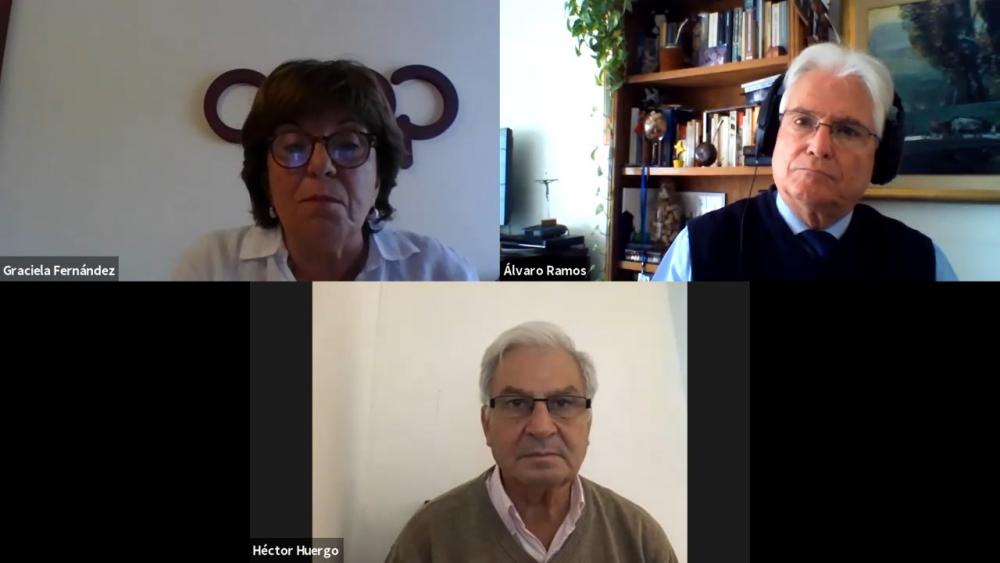Cooperatives and associations are vital in strengthening the contribution of family farming to food supply

San Jose, 27 May 2020 (IICA). Driving cooperativism and associative enterprises will be essential in the aftermath of Covid-19 to strengthen the role of family farming in supplying food to the people of the Americas.
President of Cooperatives of the Americas, Graciela Fernández, and former Minister of Agriculture and Foreign Affairs of Uruguay, Álvaro Ramos, both agreed that these elements, coupled with differentiated public policies, digitalization and connectivity for training, technical assistance and access to health information, will strengthen the short circuits that rely on family farmers for their food supplies.
The specialists were participating in a webinar organized by the Inter-American Institute for Cooperation on Agriculture (IICA), which is part of a series in which the specialized hemispheric agency for agriculture and rurality analyses post-pandemic scenarios.
Ramos indicated that, “The major challenges I foresee for the future will be the need to establish differentiated public policies, given that needs differ according to region and country, as well as to provide the producer with technical assistance, rural extension services, financing and access to sanitary and phytosanitary information. We will also need protocols and inputs to guarantee safe food for the consumer”.
Other critical issues stressed by the former minister were the importance of connectivity and digitalization; innovation in technology and communication platforms for family farming; and the use of cooperatives, due to their effectiveness in applying public policy instruments.
Graciela Fernández added that the cooperative system provides useful tools for development and for strengthening the leading role that family farming plays in the region and in trade systems.
The President of Cooperatives of the Americas indicated that, “This sector can offer many contributions, for example, inter-cooperation among savings and loan cooperatives that provide financing to farmers’ cooperatives and to individual small farmers to get ahead and to stay afloat in this complex climate. Consumer cooperatives can also assist farming cooperatives to place their products in the market”.
Challenges and the contribution of family farming
Fernández and Ramos explained that the crisis in the agrifood sector during this pandemic has been a factor of the demand more than it has been of the supply, as consumption patterns have changed. This may be due to consumers’ lack of or reduced income and social confinement, which has altered the way in which goods are supplied.
Ramos commented that, “Family farming in the region is being affected by disruptions in the supply chain, as companies that process, package and transport products are facing difficulties and are cutting back on payments; discontinuing credit arrangements or reducing them substantially; and are experiencing problems in carrying out their production processes”.
Fernández indicated that family farming in Latin America and the Caribbean accounts for almost 15% of the region’s global agrifood exports and consumes 6% of imports. Thus, he explained that “The pandemic has had serious repercussions in this sector”.
He stated that there has been an almost 5% contraction in exports in certain areas, due to social distancing measures and the impact on the transportation of inputs, as a result of border closures in the region. This has directly affected short chains and perishable items, in turn impacting family farmers and consumers.
Fernández and Ramos emphasized that despite the current difficulties, family farmers continue to produce food, accounting for between 60% to 70% of the production of basic food items, depending on the country.
They warned that the health crisis is triggering a global trade crisis, involving greater protectionism and the tendency to apply more rigorous sanitary standards, which will compel family farmers and exporters to apply stricter safety and quality standards to maintain market access.
The final webinar in the IICA series will take place on Thursday at 4 p.m. (Costa Rica time) and will focus on the topic of the post-Covid-19 situation from the perspective of Caribbean countries.
It will be livestreamed from the Institute’s Virtual Conference Room and its official Facebook, YouTube and Instagram accounts.
The presentations from previous seminars are available for comments and discussion on the IICA Blog – “Cultivating Tomorrow’s Agriculture Today”: https://blog.iica.int/en.
Upcoming webinar:
Post-Covid-19 from the perspective of Caribbean countries | Thursday, 28 May
Presenters:
Chelston Brathwaite, Director General Emeritus of IICA.
James Fletcher, former Minister of Energy of Saint Lucia.
Livestream from FB Live, YouTube and the IICA Virtual Conference Room: 4:00 p. m. Costa Rica time.
More information:
Federico Villarreal, Director of Technical Cooperation, IICA.
federico.villarreal@iica.int